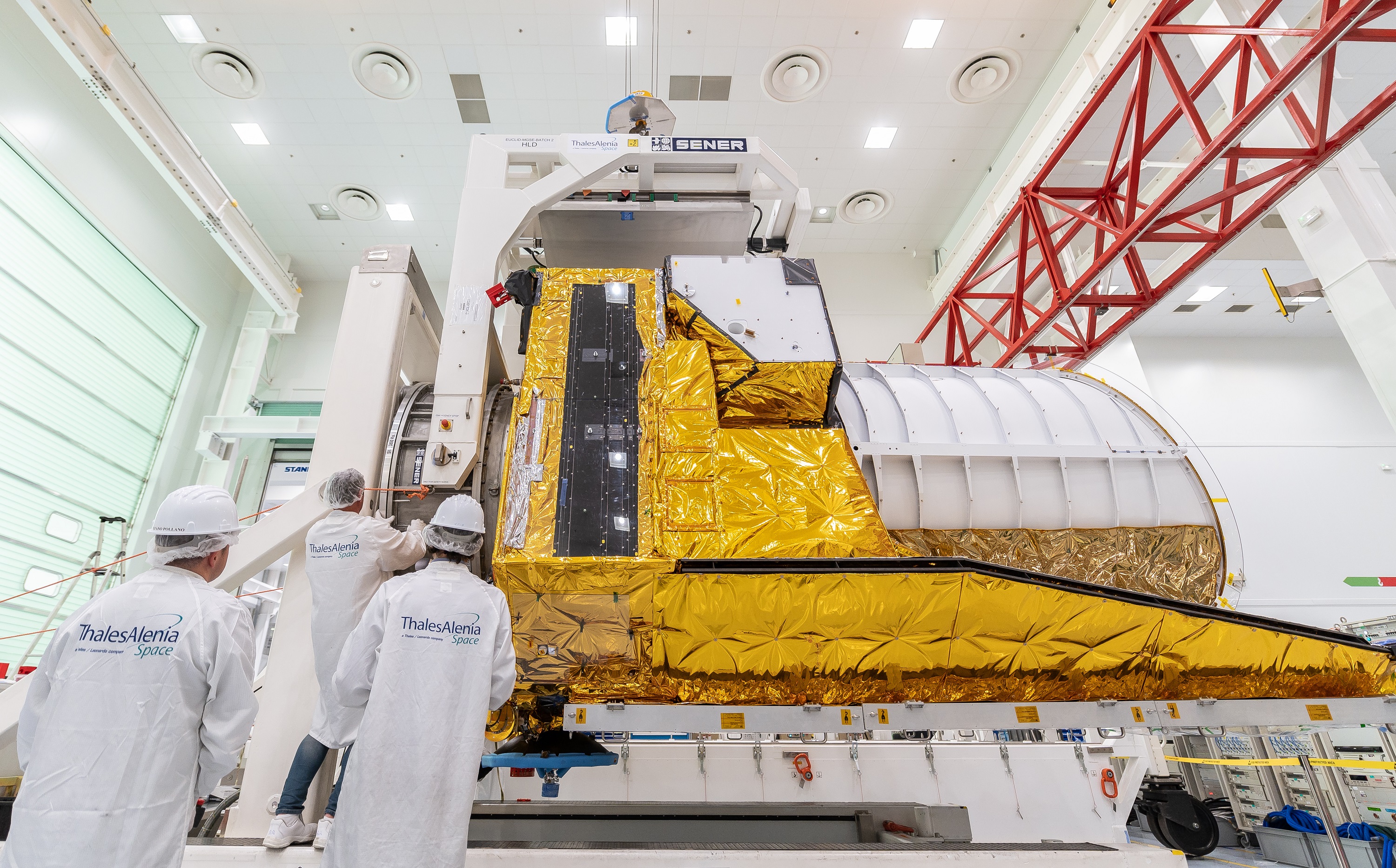Thales Alenia Space, alongside ESA, at the core of such an extraordinary mission that will open new pages of modern cosmology
- The Euclid ESA mission will explore dark energy and dark matter to better understand the origin of the accelerated expansion of the Universe
- Thales Alenia Space is the industrial prime contractor for the European Space Agency
- A total of more than 2500 members are registered in the Euclid Consortium, including more than 1500 active researchers in astrophysics, cosmology, theoretical physics and particle physics. Also contributing to Euclid are about 300 laboratories covering all fields relevant to the mission, spanning astrophysics, cosmology, theoretical physics, high energy physics, particle physics and space science.
Turin, 1 July 2023 – Thales Alenia Space, the joint venture between Thales (67%) and Leonardo (33%) is the prime contractor for the European scientific satellite Euclid that has been successfully launched to explore dark energy and the mysteries of dark matter, thus contributing to understand some of the secrets of the universe.
Euclid is the technological gem in the ambitious scientific missions of the European Space Agency (ESA) with the contribution of many national space agencies, including ASI, CNES and UKSA - the Italian, French and UK Space Agencies. It was successfully launched atop a SpaceX Falcon 9 vehicle from Cape Canaveral in Florida.
During its six-year mission, Euclid will map the large-scale structure of the universe out to a distance of more than 10 billion light-years to show how it has expanded and how its structure has evolved over the last three-quarters of its history.

© Thales Alenia Space/Imag[IN]
The mission is designed to answer some of the most fundamental questions in modern cosmology, such as how the universe formed and why it is expanding at an accelerating rate instead of being slowed by gravitational attraction.
Euclid is set to map several billions galaxies in three dimensions. The light from these galaxies is deflected by gravitational interaction with dark and luminous interstellar matter before it reaches us on Earth, an effect known as gravitational lensing, producing a distortion in the galaxies shape. By measuring such distortions in imagery obtained by Euclid, scientists will be able to observe how the mysterious dark matter is distributed throughout the universe and how it is evolving over cosmic timescales, under the combined effect of gravity and dark energy—key to understanding why the universe’s expansion is now accelerating after billions of years from the Big Bang.
“I am really pleased with this launch and knowing that our expertise, our technology and our ability will help humankind to better understand some of the greatest mysteries of the universe” said Massimo Comparini Deputy CEO, ESVP Observation Exploration Navigation at Thales Alenia Space. “This launch confirms Thales Alenia Space's absolute ability to lead the development of high-tech scientific missions such as Euclid through an industrial consortium including SMEs and hand-to-hand with the scientific community. This project has benefited from our company's past experience with the construction of numerous scientific platforms, including those of the Herschel and Planck satellites. Another jewel of technology is added to the long list of satellites developed by Thales Alenia Space to serve cutting-edge science.”
Thales Alenia Space is the prime contractor for Euclid mission satellite and is also responsible for its service module, as well as leading the industrial team of more than 80 highly specialized companies and 140 subcontractors from 20 European countries, among them Airbus Defence and Space supplying the telescope, Leonardo providing key equipment, and a variety of highly-skilled small and medium sized companies. Thales Alenia Space program team and the entire industrial consortium have been working on this amazing mission for ten years, since July 2013. This mission is particularly important for Thales Alenia Space’s teams as it perfectly illustrates the company’s purpose – Space for Life – for a better understanding of Earth and the Universe.

© Thales Alenia Space
A complex orchestra with instruments playing together
Euclid’s payload consists of a 1.2-meter-diameter telescope and a cold optical bench housing the focal plane of the two optical instruments: the Visible Instrument (VIS) and the Near Infrared Spectrometer and Photometer (NISP). Euclid’s telescope is designed to operate in the visible portion of the spectrum and the near-infrared, just beyond the range of red wavelengths the human eye can see. It will collect light from distant cosmic objects and convey it to the two instruments. These two instruments will operate in tandem, simultaneously recording data from the same patch of sky targeted by the telescope.
- The VIS instrument will precisely measure galaxy shapes by using the clearest images of distant galaxies, via a mosaic of 36 CCD sensors, each composed of a matrix of 4,000 x 4,000 pixels. This gives the detector a total of more than 600 megapixels.
- The NISP instrument will use 16 HgCdTe near infrared detectors, each composed of a matrix of 2000 x 2000 pixel, and will obtain spectroscopic measurements of galaxies by splitting their light into individual wavelengths to deduce their redshift. This will allow cosmologists to estimate from their recession speed how far away these galaxies are.
The combining VIS and NISP data will help scientists to determine the growth rate of galactic structures and thus measure the amount of dark matter and dark energy and discern a possible effect of a different behavior of gravity at cosmic scale from Einstein’s General Relativity predictions. Euclid’s data will constitute the largest, most accurate 3D survey of the Universe ever undertaken.

© Thales Alenia Space
Communicating at 1.5 million kilometers distance
Standing 4.7 meters tall and weighing about 2 metric tons at launch, Euclid will deliver 150,000 high-definition images and associated chromatic and spectral information, amounting up to 850 gigabits of data per day. This huge amount of data will be transmitted by the satellite from its orbit around the L2 Sun-Earth Lagrangian point at a distance of 1.5 million kilometers from the Earth, using its K-band (26 GHz) radiofrequency data transmission system. Euclid also incorporates an X-band system to control and monitor the spacecraft and measure its distance to Earth.
ABOUT THALES ALENIA SPACE
Drawing on over 40 years of experience and a unique combination of skills, expertise and cultures, Thales Alenia Space delivers cost-effective solutions for telecommunications, navigation, Earth observation, environmental management, exploration, science and orbital infrastructures. Governments and private industry alike count on Thales Alenia Space to design satellite-based systems that provide anytime, anywhere connections and positioning, monitor our planet, enhance management of its resources, and explore our Solar System and beyond. Thales Alenia Space sees space as a new horizon, helping to build a better, more sustainable life on Earth. A joint venture between Thales (67%) and Leonardo (33%), Thales Alenia Space also teams up with Telespazio to form the parent companies’ Space Alliance, which offers a complete range of services. Thales Alenia Space posted consolidated revenues of approximately 2.2 billion euros in 2022 and has around 8,500 employees in 17 sites in 10 countries across Europe and a plant in the USA.
THALES ALENIA SPACE – PRESS CONTACTS
Sandrine Bielecki
Tel: +33 (0)4 92 92 70 94
sandrine.bielecki@thalesaleniaspace.com
Catherine des Arcis
Tel: +33 (0)6 78 64 63 97
catherine.des-arcis@thalesaleniaspace.com
Cinzia Marcanio
Tel.: +39 (0)6 415 126 85
cinzia.marcanio@thalesaleniaspace.com


